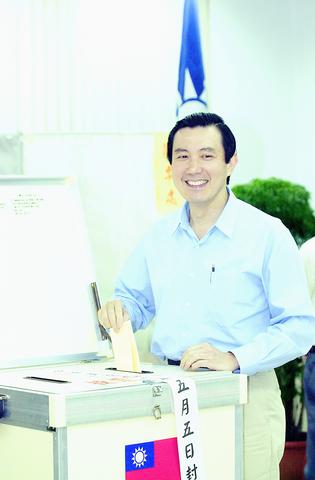The KMT, Taiwan's largest political party, held its first party primaries yesterday to select candidates for the year-end elections, a step to further implement the party's democratic reform following its direct election for party chairman on March 24.
"Today's primaries are proof of the party's democracy," said Taipei Mayor Ma Ying-jeou (馬英九) while casting his vote in the party's headquarters in Taipei yesterday morning.

PHOTO: GEORGE TSORNG, TAIPEI TIMES
Ma said that it is impossible to meet every party member's expectation to choose candidates by either party appointments or the primary, and hoped that "each candidate will respect the final outcome of the election."
The primaries took place in 395 voting stations in 12 of the nations 28 constituencies from 8am to 4pm yesterday. Candidates will be chosen in accordance with the ballots from party members and public polls taken by two companies last week. The two parts each constitute 50 percent of a candidate's overall score in the primary.
Based on the results of yesterday's primaries, the KMT will name its candidates for the year-end elections of legislators, county commissioners and provincial-level city mayors in a Central Standing Committee (中常委) meeting on Wednesday.
But some legislative candidates criticized the fact that the party had failed to finalize its nomination quota for each legislative constituency prior to the primaries, which they said will give the party leadership a chance to exert its influence over the nomination process just as it has done in the past.
Party officials responded by saying that due to diverse electoral conditions in each constituency, "the party will decide the quota according to the outcome of each primary."
Other analysts have warned that the KMT may face a split or exodus of members before the year-end elections because of the Executive Yuan's "black gold exclusion clause" (
The restrictions will present a dilemma for the KMT who will have to decide whether to field members in elections who may lose their electoral qualifications due to the clause even if they win a primary.
When asked if the party will lose some important members after the primary, Chairman Lien Chan (

DAREDEVIL: Honnold said it had always been a dream of his to climb Taipei 101, while a Netflix producer said the skyscraper was ‘a real icon of this country’ US climber Alex Honnold yesterday took on Taiwan’s tallest building, becoming the first person to scale Taipei 101 without a rope, harness or safety net. Hundreds of spectators gathered at the base of the 101-story skyscraper to watch Honnold, 40, embark on his daredevil feat, which was also broadcast live on Netflix. Dressed in a red T-shirt and yellow custom-made climbing shoes, Honnold swiftly moved up the southeast face of the glass and steel building. At one point, he stepped onto a platform midway up to wave down at fans and onlookers who were taking photos. People watching from inside

A Vietnamese migrant worker yesterday won NT$12 million (US$379,627) on a Lunar New Year scratch card in Kaohsiung as part of Taiwan Lottery Co’s (台灣彩券) “NT$12 Million Grand Fortune” (1200萬大吉利) game. The man was the first top-prize winner of the new game launched on Jan. 6 to mark the Lunar New Year. Three Vietnamese migrant workers visited a Taiwan Lottery shop on Xinyue Street in Kaohsiung’s Gangshan District (崗山), a store representative said. The player bought multiple tickets and, after winning nothing, held the final lottery ticket in one hand and rubbed the store’s statue of the Maitreya Buddha’s belly with the other,

‘NATO-PLUS’: ‘Our strategic partners in the Indo-Pacific are facing increasing aggression by the Chinese Communist Party,’ US Representative Rob Wittman said The US House of Representatives on Monday released its version of the Consolidated Appropriations Act, which includes US$1.15 billion to support security cooperation with Taiwan. The omnibus act, covering US$1.2 trillion of spending, allocates US$1 billion for the Taiwan Security Cooperation Initiative, as well as US$150 million for the replacement of defense articles and reimbursement of defense services provided to Taiwan. The fund allocations were based on the US National Defense Authorization Act for fiscal 2026 that was passed by the US Congress last month and authorized up to US$1 billion to the US Defense Security Cooperation Agency in support of the

HIGH-TECH DEAL: Chipmakers that expand in the US would be able to import up to 2.5 times their new capacity with no extra tariffs during an approved construction period Taiwan aims to build a “democratic” high-tech supply chain with the US and form a strategic artificial intelligence (AI) partnership under the new tariffs deal it sealed with Washington last week, Taipei’s top negotiator in the talks said yesterday. US President Donald Trump has pushed Taiwan, a major producer of semiconductors which runs a large trade surplus with the US, to invest more in the US, specifically in chips that power AI. Under the terms of the long-negotiated deal, chipmakers such as Taiwan Semiconductor Manufacturing Co (TSMC, 台積電) that expand US production would incur a lower tariff on semiconductors or related manufacturing